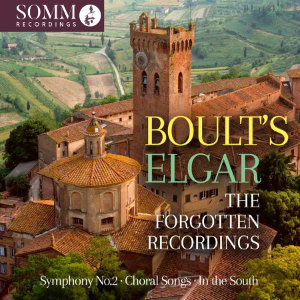
Sir Edward Elgar (1857-1934)
Boult’s Elgar: the forgotten recordings
rec. 1944-67
No texts
SOMM Ariadne 5037-2 [2 CDs: 149]
Released at the same time as Nigel Simeone’s book Edward Elgar and Adrian Boult, this twofer, with notes by Simeone himself, focuses on what Somm terms ‘forgotten recordings’. These range from the first release on CD of major Boult statements, such as his 1963 recording of the Second Symphony with the Scottish National Orchestra, to a 29-minute conversation between Boult and Bernard Keefe in 1965 and backwards to wartime examples of his art. It’s inevitably, therefore, something of a melange, but an interesting and valuable one.
Boult was in the recording doldrums in 1963. He was now 74 and his name carried little cachet for the majors so it was left to Waverley Records, who usually specialised in Scottish traditional music, to record him in the work with which he had been closely associated for over forty years, the Second Symphony. It had been Boult’s 1920 performance, before which he’d had coaching from Elgar, which succeeded in establishing the symphony after its early neglect. Boult had conducted Alexander Gibson’s Scottish National Orchestra in 1962 in a series of performances of the symphony and this recording duly followed in September 1963. Simeone is highly complimentary about the recording and critics of the time were too and it’s perfectly true that the architectural imperatives that Boult invariably achieved are intact. The orchestra, too, under Gibson was to achieve a consistency and standard of execution that was matched at the time, if not surpassed, by Silvestri in Bournemouth. However, there are details that are unsatisfactory, at least to me. Balances, notwithstanding the comments of the Gramophone critic of the day cited in the notes, are not always the best and there are weaknesses in the playing – the strings are thin-toned and the brass, usually a Scottish National strength, don’t always impress in the first movement. The playing gets better as the symphony develops and the slow movement is, as ever, the high point but it can’t, in all honesty, compare to his Lyrita LP or to his later live performances.
The other work in CD1 is the 1944 BBC Symphony broadcast recording of In the South, another work Elgar discussed in detail with Boult when he gave his performance of it in 1918. It was recorded earlier in the year than Boult’s famously white-hot commercial recording of the Second Symphony, and displays real unshakeable consistency with his two later studio recordings. It strikes me that the transfer is a touch sonically constricted. It’s also been released by Beulah.
Disc 2 contains choral songs and talks. Boult never conducted a disc of Elgar’s choral or part songs so far as I’m aware but he gave a broadcast in stereo in 1967 with the BBC Chorus that contained a number of them. The chorus had a strong contingent of basses and make a sonorous tone for these Opp. 53, 71, 72 and 73 songs adding Go, song of mine, Op.57. Perhaps unexpectedly the Two Choral Songs, Op.73 using Rosa Newmarch’s adaptations of Russian texts, prove the most passionately sung of all. This is an area of Boult’s conducting that has been somewhat overlooked over the years.
During the War (24 February 1944, Home Service) Boult recorded a short two-minute conversation with Elgar’s daughter, Carice which is making its first CD appearance. It’s scripted – even Boult’s laughs are clearly scripted – but makes for useful listening. More substantial is a 12-minute BBC talk given in 1951, also making its first CD appearance, called ‘Sir Edward Elgar as I knew him’. Boult recounts Elgar taking him through the scores performed on CD 1, as well as recalling Elgar’s still-simmering dislike of Birmingham (because of the failure of the premiere of The Dream of Gerontius), his sense of fun but also his well-known gracelessness and moodiness. Small segments of music from a 1936 recording of the Enigma Variations are included. The final, previously unreleased-on-CD interview is one with Bernard Keefe in 1965. This covers what is now fairly well-trodden ground – Boult’s youth, Oxford, his Leipzig days, his abandoned compositions, and then the BBC days where he enjoyed unprecedented rehearsal conditions, the Queen’s Hall, Toscanini’s energy and the function of his ‘concentration’ and Boult’s equal admiration for Bruno Walter.
Boult recorded the Second Symphony a number of times, both in the studio and live, so whether you’ll want this Scottish performance will depend on your need levels. The remainder of the programme offers interesting insights into his career, his BBC years, his choral conducting, and examples of his speaking at some length.
Jonathan Woolf
Buying this recording via a link below generates revenue for MWI, which helps the site remain free



Contents
In the South (Alassio), concert overture Op.50 (1904)
Symphony No.2 in E flat, Op.63 (1911)
Four Part Songs, Op.53 (1907)
Two Choral Songs, Op.71 (1914)
Death on the Hills, Op.72 (1914)
Two Choral Songs, Op.73 (1914)
Go, song of mine, Op.57 (1909)
Adrian Boult in conversation with Carice Elgar Blake
Sir Edward Elgar as I knew him, a personal portrait by Adrian Boult
Adrian Boult in conversation with Benard Keefe
BBC Symphony Orchestra (In the South)
Scottish National Orchestra (Symphony No.2)
BBC Chorus
Recording details
March 1944, Corn Exchange Bedford (In the South): September 1963 (Symphony No.2): February 1967, Maida Vale, London (Choral music): February 1944, Corn Exchange Bedford (talk with Carice Elgar Blake): April 1951, Maida Vale, London (Sir Edward Elgar as I knew him): November 1965, Maida Vale, London (In conversation with Bernard Keefe)

















